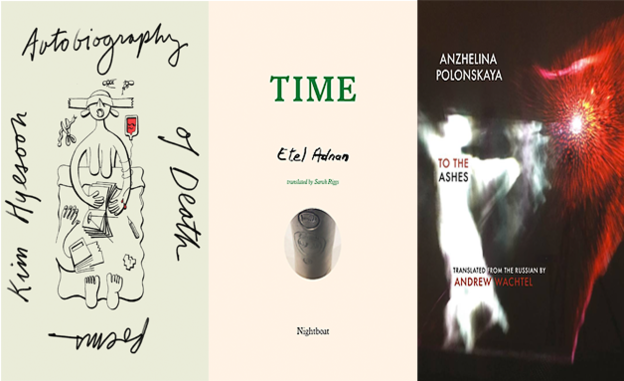
Translating grief
Quinn Gruber

J2 summer intern Quinn Gruber writes on three translated titles that parse loss: Autobiography of Death by Kim Hyesoon, Time by Etel Adnan, and To the Ashes by Anzhelina Polonskaya.
Autobiography of Death, Kim Hyesoon, trans. Don Mee Choi, art by Fi Jae Lee (New Directions, 2018)
Autobiography of Death rings like a “four-ton bronze bell with the names of the dead engraved on it.” Death speaks in “endless lightning bolts of rhythmic beats,” a rhythm that drives Hyesoon’s poems forward in face of the tragedies of Korea’s history: the Sewol Ferry incident, the Gwangju Uprising. “Lean your body on the water and cling to it,” Hyesoon writes, encouraging us to live despite knowing that our bodies are vessels for our own deaths. Choi’s striking translation demonstrates the strength of the Korean people in a world filled with loss: “I’ve split into two but I’m alive / I’ve split into five but I’m alive / I’ve become powder but I’m alive.”
Time, Etel Adnan, trans. Sarah Riggs (Nightboat Books, 2019)
Etel Adnan writes that “the self is an image of an / image, a postcard” and “the body is a sacred place / because it bursts with life and lasts / briefly.” Time moves through years and distances as a postcard does, sent from afar and calling us to join it in its grief. History grounds us, but cannot stifle growth. In the face of loss, violence, and exile, we can only survive. “In the splendor of the / gray morning, / in the death camp / of Beit Sahour, / with a little dew / and a handful of clay, / we created / life.”
To The Ashes, Anzhelina Polonskaya, trans. Andrew Wachtel (Zephyr Press, 2019)
Weighty with grief born from literary exile, losing family and home, To The Ashes is heart-wrenching in its overwhelming sense of loss. It presses forward, because to surrender to despair would mean death: “And you can’t fall down, can’t rest, / can’t even squint, / because if you close your eyes / you give the guns a chance.” Polonskaya balances forward motion with mourning, and Wachtel’s translation carefully preserves the simplicity of the language without sacrificing any of its impact. “And perhaps, at the last moment, in despair, / you’ll understand / how hard it was for me to mourn.”